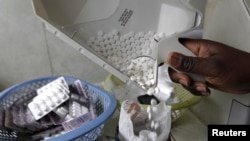There was a collective sigh of relief for more than 350,000 HIV-positive patients in Botswana, after the southern African country's Court of Appeal ruled in favor of the government in a legal tussle over the supply of life-prolonging anti-retroviral (ARV) drugs.
In January, Botswana's government was taken to court by a major ARV supplier that cited irregularities in the awarding of a contract for the provision of the drugs. The High Court ruled in favor of that company, Portfolio Pharmaceuticals, and the supply of ARVs was halted until the matter was resolved.
The move sparked a countrywide shortage of the critical drug, which the government said had left thousands of lives at risk.
On Friday, the country's Court of Appeal overturned the lower's court's judgment in favor of the government.
Boitumelo Malatha, who is HIV positive, was elated by the court's decision, saying it has been a "nightmare" to get the drugs.
"If I could tell you how I have been living for the past few months, it has really been devastating, because you can imagine I don't have much funds to travel back and forth to hospital to get medication," Malatha said. "I am happy that things will now go back to normal."
In passing judgment, the president of the Court of Appeal, Ian Kirby, criticized the lower court's decision, saying it was a matter of life and death.
The director of the Botswana Network on Ethics Law and HIV/AIDS (BONELA), Cindy Kelemi, said the case should serve as a reminder to the government to review its procurement process.
"One of the weaknesses we identified as an organization is that the government had entered into an exclusive contract," Kelemi said. "In our view, we cannot enter into an exclusive contract if we are dealing with essential drugs, such as ARVs."
Government reaction
Botswana's Ministry of Health Permanent Secretary, Ruth Maphorisa, said vital lessons have been learned and supply processes will be reviewed.
"In the long term, given the experiences that we have we had, as a ministry, we have a plan of ensuring that there is adequate supply at any given time. It is a policy matter that we want to take a stand on," Maphorisa said.
Botswana has the third-highest HIV prevalence in the world, but has been widely lauded for its efforts to fight the scourge. The drawn-out case was threatening to reverse gains, as some patients were reported to be in danger of skipping treatment.





